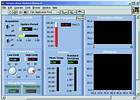

National Instruments Southern Africa recently completed its first certified LabVIEW training course for 2002. This popular course was filled to capacity and more courses will be run during the year. The course was held in Midrand.
"The class accelerates the learning curve for beginners and is also valuable to existing users as a refresher, the course also shows the short cuts for creating VIs faster," says local manager, Michael Hutton.
Dennis Naude, the local National Instruments field applications engineer, instructed the course that is comprised of a three-day basics course with an additional two-day more advanced course. Naude has presented this course numerous times before in the US - but this was only the second time that he has done so in South Africa.
LabVIEW is a productive graphical programming language for building data acquisition and instrumentation systems. With LabVIEW, users quickly create user interfaces that give them interactive control of their software system. To specify their system functionality, they simply assemble block diagrams - a natural design notation for scientists and engineers. Its tight integration with measurement hardware facilitates rapid development of data acquisition, analysis, and presentation solutions. LabVIEW contains powerful built-in measurement analysis and a graphical compiler for optimum performance. The software is available for Windows 2000/NT/Me/9x, Mac OS, Linux, Sun Solaris, and HP-UX, and comes in three different development system options.
Courses starting mid-2002
The courses are to be held in three blocks: Basics I and Basics II will run in mid July, with the advanced course beginning at the end of September. Details are as follows:
LabVIEW Basics I
Date: 15, 16 and 17 July 2002.
Venue: Midrand.
Course overview
This course equips delegates to effectively use LabVIEW for the following:
* Acquire analog waveforms using a DAQ board, store the waveforms in a file, and retrieve.
* Collect and log temperature data.
* Acquire waveforms from a GPIB and serial instrument.
* Plot data acquired on strip charts and graphs.
* Save data in files that you can retrieve with a spreadsheet.
* Share measurement data across the Internet.
LabVIEW Basics II
Date: 18 and 19 July 2002.
Venue: Midrand.
Course overview:
This course trains one to use LabVIEW to:
* Plan and build a large application.
* Create block diagrams that are easier to understand.
* Increase the execution speed of a VI.
* Read and write binary data files.
* Design and implement modular projects.
LabVIEW Advanced
Performance and communication course.
Date: 30 September - 2 October.
Venue: Midrand.
Overview:
The LabVIEW advanced performance and communication course prepares the attendee to take advantage of the advanced design features of LabVIEW. These advanced features help developers to improve system performance while providing a greater degree of control over applications. The course also focuses on technologies for communicating between various computers and applications. The hands-on format of the course enables attendees to immediately apply concepts learned to their applications.
Audience:
* LabVIEW Fundamentals (Basics I and II) attendees.
* LabVIEW users needing to incorporate advanced features into their applications.
* LabVIEW users pursuing the certified developer certification.
The course equips the attendees to:
* Optimise the performance of their applications.
* Make effective use of ActiveX and VI server technologies with LabVIEW.
* Incorporate TCP/IP for PC to PC communication.
* Create interactive Web pages that communicate with their LabVIEW application.
* Create Dynamic Link Libraries (DLLs) within LabVIEW.
* Use DataSocket technology for advanced data communication.
* Transfer data between LabVIEW and Microsoft Office applications with ActiveX.
* Synchronise data flow and program execution in LabVIEW.
* Identify and eliminate memory leaks.
* Improve error handling in their applications.
Prerequisites: Note that this advanced course requires LabVIEW Fundamentals courses (Basics I and II), or equivalent LabVIEW experience.
Note that there is a maximum of 10 participants per class on a first come first served basis, and a nonrefundable deposit of R1000,00 is required to secure a place.
National Instruments
South Africa
011 805 8197

© Technews Publishing (Pty) Ltd | All Rights Reserved